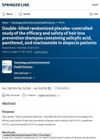1 citations,
February 2023 in “Ibrain” Black cumin and its nanoformulations show promise in treating neurodegenerative diseases.
1 citations,
January 2023 in “Science Advances” The skin's microbiome helps hair regrow by boosting certain cell signals and metabolism.
 1 citations,
July 2022 in “Plant Cell, Tissue and Organ Culture (PCTOC)”
1 citations,
July 2022 in “Plant Cell, Tissue and Organ Culture (PCTOC)” The study found that in Eclipta prostrata roots, coumestans come from acetate and shikimate pathways, and phenylpropanoid is made only through the shikimate pathway.
 1 citations,
April 2022 in “Toxicology and Environmental Health Sciences”
1 citations,
April 2022 in “Toxicology and Environmental Health Sciences” The shampoo with salicylic acid, panthenol, and niacinamide is effective and safe for preventing hair loss in people with alopecia.
 1 citations,
February 2022 in “Biological Trace Element Research”
1 citations,
February 2022 in “Biological Trace Element Research” The combination of Arginine Silicate Inositol Complex and a new form of Biotin improved hair and nail growth in rats.
1 citations,
February 2022 in “Journal of the American Academy of Dermatology” Taking biotin supplements can be risky and often lacks evidence of effectiveness for skin, hair, and nail issues.
 1 citations,
January 2022 in “Stem cell biology and regenerative medicine”
1 citations,
January 2022 in “Stem cell biology and regenerative medicine” New methods to test hair growth treatments have been developed.
 1 citations,
October 2021 in “Clinical, Cosmetic and Investigational Dermatology”
1 citations,
October 2021 in “Clinical, Cosmetic and Investigational Dermatology” Vitamin B3 may help prevent hair loss and promote hair growth by protecting scalp cells from stress and reducing hair growth-blocking proteins.
1 citations,
January 2021 in “Wits Journal of Clinical Medicine” Long COVID causes lasting symptoms and needs ongoing care.
1 citations,
August 2016 in “Hanbang an'i'bi'in'hu pibu'gwa haghoeji” YangHyulEum Gami-Bang extract may help treat hair loss.
 November 2024 in “Journal of Clinical Medicine”
November 2024 in “Journal of Clinical Medicine” The treatment improved hair thickness, shine, and reduced hair loss effectively.
 November 2024 in “International Journal of Molecular Sciences”
November 2024 in “International Journal of Molecular Sciences” Nanoparticles may improve caffeine delivery for hair growth, offering a potential alternative to minoxidil for hair loss treatment.
 November 2024 in “Applied Sciences”
November 2024 in “Applied Sciences” Placenta products might help with hair loss, but more research is needed.
 September 2024 in “International Journal of Molecular Sciences”
September 2024 in “International Journal of Molecular Sciences” Hydrangea serrata extract may promote hair growth and improve hair health.
 July 2024 in “Skin Appendage Disorders”
July 2024 in “Skin Appendage Disorders” The supplement significantly improves hair density and appearance in people with hair loss.
 June 2024 in “Computational and Structural Biotechnology Journal”
June 2024 in “Computational and Structural Biotechnology Journal” Multi-omics techniques help understand the molecular causes of androgenetic alopecia.
 June 2024 in “Molecules/Molecules online/Molecules annual”
June 2024 in “Molecules/Molecules online/Molecules annual” Platycladus orientalis flavonoids protect balding hair from UV damage and slow hair color change.
June 2024 in “Regenerative Therapy” Exosomes from stem cells may help rejuvenate skin and regrow hair, but more research is needed.
 May 2024 in “Scientific African”
May 2024 in “Scientific African” Three natural compounds from Ghanaian plants may help treat BPH and alopecia.
 May 2024 in “BMC veterinary research”
May 2024 in “BMC veterinary research” Metabolites and diet affect hair growth cycles in cashmere goats.
 May 2024 in “European Journal of Immunology”
May 2024 in “European Journal of Immunology” Vitamin B5 and coenzyme A may help regulate the immune system and could improve treatments for chronic diseases and cancer.
 May 2024 in “Indian Journal of Dermatology”
May 2024 in “Indian Journal of Dermatology” Androgenetic alopecia in men is genetic and linked to health issues like obesity and heart disease, with treatments including minoxidil, finasteride, and hair transplants.
 April 2024 in “Nigerian Postgraduate Medical Journal”
April 2024 in “Nigerian Postgraduate Medical Journal” Androgenetic alopecia is a common hair loss condition influenced by various factors and linked to psychosocial and cardiovascular issues.
 March 2024 in “International journal of molecular sciences”
March 2024 in “International journal of molecular sciences” Zinc, copper, and iron are important for skin health and may help diagnose skin diseases.
March 2024 in “Antioxidants” Excessive blue light harms eye cells and disrupts sleep patterns.
 March 2024 in “Cell communication and signaling”
March 2024 in “Cell communication and signaling” Lack of sleep in mice leads to prostatitis by reducing certain hormones and activating an inflammatory pathway, which can be temporarily fixed with normal sleep.
March 2024 in “International journal of molecular sciences” Mitochondrial dysfunction is linked to various skin conditions and could be a target for treatments.
February 2024 in “Veterinary sciences” Canine pemphigus foliaceus involves significant immune activity and shares similarities with human pemphigus.
 February 2024 in “Skin health and disease”
February 2024 in “Skin health and disease” Many popular skincare products claim to prevent aging but lack strong evidence to prove their effectiveness and safety.
 January 2024 in “Biology of sex differences”
January 2024 in “Biology of sex differences” Dihydrotestosterone makes arteries stiffer in female mice by reducing estrogen receptor expression.




















